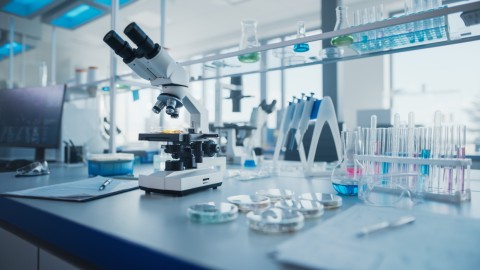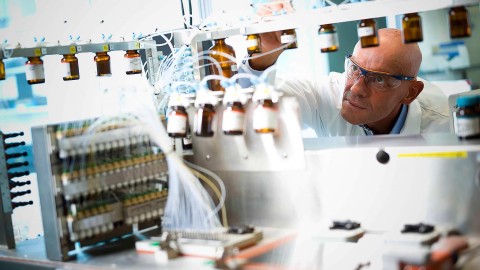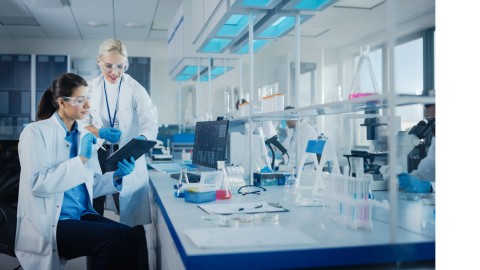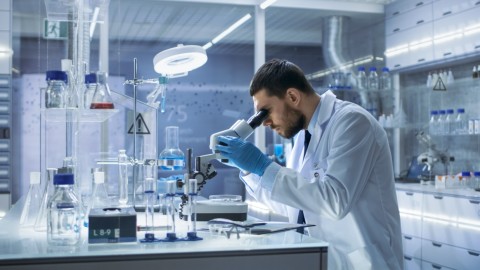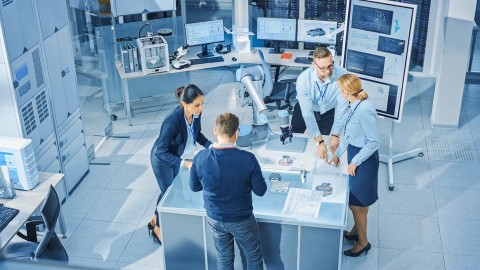Environment, health and safety in modern-day laboratories
Germany is the world’s fourth-largest chemical innovator after the US, China and Japan. However, research and development are regaining importance not just in the chemical sector, but also in other globally competitive industries. Companies today face many other challenges as well, including the need to operate sustainably, conserve resources, protect the environment and provide safe and healthy work environments. These trends have not stopped at the laboratory door, either.
Table of contents
- New working methods – and how they affect laboratories
- Operator responsibility – a challenge on many levels
- Specific legal requirements for health and safety in laboratories
- Health and safety duties immediately included in operator responsibilities
- How Infraserv can help you with EHS
- Learn more today at no obligation to you!
The most important innovations today are the product of interdisciplinary collaboration spanning multiple industries and research areas. And this is only possible because departments, companies and institutions are more tightly connected than ever before. One proven way to promote interdisciplinary integration is to create open work environments that encourage informal interaction and constant cross-pollination with ideas and inspiration.
“Laboratories are much more tightly integrated in company processes than before – and so are far more innovative.”
New working methods – and how they affect laboratories
Interdisciplinary collaboration is increasingly affecting how laboratories are set up and run, too. Conventional laboratories are giving way to open-space environments and multi-user models in which people work side-by-side on entirely different projects. In these new settings, employees can constantly share ideas and experiences in a casual, informal way with their colleagues at the next bench over. Whenever laboratory work processes change this dramatically, health, safety and environmental measures should adapt in response:
- Health, safety and environmental requirements have to be baked into the design from the start and additionally considered when building and outfitting the actual laboratory. They also cover facility expansions or conversions conducted during regular lab operations. Open-space and multi-user laboratories obviously have more complex requirements than conventional facilities – partly due to the room structure but also due to the interdisciplinary nature of the work processes as well as the broader range of materials and equipment used.
- Laws and regulations such as the German Workplace Regulation (ArbStättV), the European REACH Chemicals Regulation (“Registration, Evaluation, Authorization and Restriction of Chemicals”), the German Chemicals Act (ChemG), the German Hazardous Substances Regulation (GefStoffV) and the German Technical Rules on Hazardous Substances (TRGS) lay out the foundations for sound laboratory operation. Facility operators thus have to know all these provisions and stay on top of any changes to them.
- The “Working Safely in Laboratories” guideline published by the Institution for Statutory Accident Insurance and Prevention for the Raw Materials and Chemical Industry (BG RCI) describes all the safety issues that laboratory operators and employees have to consider.
Operator responsibility – a challenge on many levels
As a facility operator, you are responsible not only for designing your laboratory to be safe and environmentally sound but also for ensuring your employees’ health and safety. According to the German Civil Code, operator responsibilities fall to whoever owns the land or building, whether an individual or a legal entity.
“Environment, health, safety and sustainability are becoming increasingly important to corporate processes and significantly influence public perception of brands.”
The requirements that operators have to meet cover, without limitation, fire protection, life safety, noise control, machine stability, traffic safety, plants that require special safety monitoring and protecting employees from electric shock as well as hazards posed by work equipment or dangerous substances. In addition, environmental issues such as immission control, soil protection, water and air pollution control, and proper waste and wastewater disposal are also the laboratory operator’s responsibility.
Delegating duties to competent experts
The upshot of all these requirements is this: Few laboratory operators can handle all the operator responsibilities themselves. They simply lack the time and specialized knowledge to do so. Instead, they generally delegate the direction and supervision of laboratory operations to various people – senior executives, line managers and the laboratory staff doing the work itself.
“The laboratory work environment as well as government requirements for operations have grown more complex in recent years.”
Many new usage models have sprouted up alongside traditional biological, chemical and physics laboratories, further complicating operators’ responsibilities to the point where laboratory staff can no longer easily do them on the side. The pros and cons of various solutions, each presenting its own special set of environmental, health and safety requirements, can only be properly understood by experts who do this kind of work every day. At that point, it only makes sense to draw on the expertise of a partner who is deeply experienced in laboratory facility management – partly to circumvent unknown pitfalls but also to constantly optimize and streamline internal (laboratory) processes.
Handing off operator responsibilities to a specialized laboratory service provider can help your business in countless ways by allowing you to:
- Focus on your core business and delegate some or all non-core operator responsibilities for health and safety to highly knowledgeable experts.
- Comply with all legal and regulatory requirements without having to sweat the details.
- Relax knowing that your laboratory meets all legal health and safety requirements and is effectively prepared for all required certifications.
- Entrust technical health and safety measures, including implementation and monitoring, to an experienced service provider – and free up more of your own human resources for research and development.
- Enjoy leaner, optimized processes, better energy efficiency and lower operating costs in more areas, including health and safety.
Specific legal requirements for health and safety in laboratories
The special laboratory equipment found in interdisciplinary state-of-the-art open-space and multi-user facilities imposes greater responsibilities on operators and requires more extensive health and safety measures based on:
- German laws such as the Occupational Safety and Health Act
- Defined interfaces between parties with responsibility for health and safety
- Passage of risk issues when supplying chemicals and hazardous substances
- DGUV 213-850 guideline (“Safely Working in Laboratories”) published and regularly updated by German Social Accident Insurance (DGUV)
- Special laboratory equipment required to fulfill the operator’s responsibility for health and safety
- Provisions of the German Energy Conservation Regulation (EnEV 2014 and 2016) and the German Building Energy Act (GEG 2019) that are relevant to laboratories and laboratory additions
- Provisions of the German Hazardous Substances and Biological Agents Regulations, the German Technical Rules on Hazardous Substances (TRGS), the German Technical Rules on Biological Agents (TRBA) and the German Genetic Engineering Safety Regulation (GenTSV)
- Requirements imposed under the Federal Immissions Control Act (BImSchG) on matters such as initial permits for new plants, changes to permitted plants or permit-required modifications to plants that do not currently need a permit
Laws and regulations on laboratory health and safety represent a minefield of ever-changing requirements that you have to constantly track in order to avoid unnecessary expense, reworking and inconveniences when seeking permits or certifications. Infraserv’s experts for laboratory facility management are fully conversant with all current regulations and will gladly advise you.
ContactHealth and safety duties immediately included in operator responsibilities
As a laboratory operator, your responsibility for your employees’ health, safety and physical integrity involves much more than the obvious health and safety measures, regular inspections and proper training.
“The thicket of laws, rules and regulations for different laboratory categories has become inscrutable to almost everyone except true specialists in the field.”
Your top priority is obviously the safety of your staff, products and the environment. That entails not only providing good protective equipment in day-to-day operations but also instituting a comprehensive, meticulously designed and well-rehearsed emergency management program. Are you sure that your business is prepared for all potential incidents and that your employees have drilled the required processes enough and can immediately provide first aid if needed?
The most efficient way to ensure health and safety is to delegate key tasks to highly trained people at key interfaces in order to provide the best possible level of safety at the most sensitive points in the laboratory. Certain activities should only be performed by duly authorized people who have all the requisite permits and approvals.
What is the best way for you to prepare for laboratory emergencies? Experts can help you develop the right strategy for your needs.
Get prepared for emergencies – schedule a consultation today!
Your other responsibilities as a laboratory operator...
- Performing and documenting a risk assessment for your laboratory in order to identify operating conditions in need of change
- Developing properly sized custom ventilation systems with the requisite overhead and underfloor exhaust systems
- Avoiding hazards posed by contaminants in exhaust ducts
- Ensuring adequate industrial fire protection
- Ensuring adequate industrial radiation protection
- Developing an effective life safety system of emergency exit and evacuation routes
- Fulfilling effective environmental protection responsibilities, including hazardous substance measurement and disposal
- Documenting activities in laboratory operations
- Training employees
How Infraserv can help you with EHS
Combining health, safety and environmental protection in a modern-day laboratory is clearly a complex challenge that can tie up a lot of resources in your organization. As an experienced partner and problem-solver in laboratory facility management, Infraserv will put its decades of experience to work for you – with individually scaled service packages for all areas of your laboratory as well as all the knowledge that our health and safety experts and radiation protection supervisors have accumulated over the years.
Infraserv’s laboratory health and safety services will ensure:
- Compliance with all regulatory requirements for regular laboratory operation
- Safe and ideal work conditions for your laboratory staff
- Legal certainty about all aspects of operating your laboratory
- Cost-effectiveness and efficient use of resources
Schedule a no-obligation consultation with our experts today!


